College Sports
Nick Saban target of fiery statement from lawyer amid NIL rumors
NEWYou can now listen to Fox News articles! A law firm involved in the historic $2.8 billion antitrust lawsuit settlement involving the NCAA and the nation’s five largest conferences ripped former college football coach Nick Saban and the possibility of an executive order from the Trump administration to deal with name, image and likeness. Attorneys […]

NEWYou can now listen to Fox News articles!
A law firm involved in the historic $2.8 billion antitrust lawsuit settlement involving the NCAA and the nation’s five largest conferences ripped former college football coach Nick Saban and the possibility of an executive order from the Trump administration to deal with name, image and likeness.
Attorneys at the Hagens Berman law firm released a statement on Monday calling Saban’s reported involvement in the potential executive order “unmerited and unhelpful.” Steve Berman, the firm’s managing partner and co-founder, called Saban and Trump’s talks “unneeded.”
CLICK HERE FOR MORE SPORTS COVERAGE ON FOXNEWS.COM
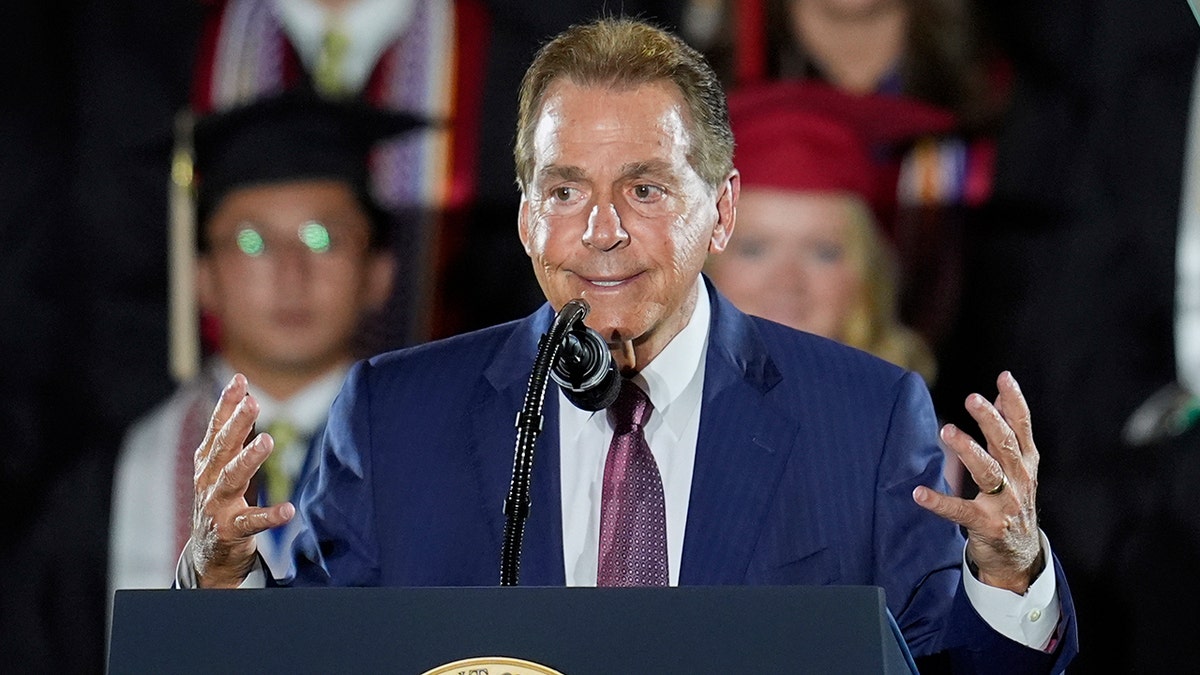
Nick Saban speaks before President Donald Trump arrives to give a commencement address at the University of Alabama, May 1, 2025, in Tuscaloosa. (AP Photo/Mike Stewart)
“While he was a coach, Saban initially opposed NIL payments to athletes, pushing to add restrictions and red-tape through national legislation to add ‘some sort of control,’” Berman said in a statement. “During his time scrutinizing the athlete pay structure, he made tens of millions of dollars and was previously the highest-paid coach in college football.
“Coach Saban and Trump’s eleventh-hour talks of executive orders and other meddling are just more unneeded self-involvement. College athletes are spearheading historic changes and benefitting massively from NIL deals. They don’t need this unmerited interference from a coach only seeking to protect the system that made him tens of millions.”
The firm added there were a number of ways college athletes have benefitted from NIL without any executive orders from the White House in any administration. The firm said it empowered athletes to earn their own income, among other positives.
Fox News Digital reached out to Saban’s rep for comment.
Trump was considering an executive order to regulate name, image and likeness in college sports after meeting with the legendary Alabama Crimson Tide coach, the Wall Street Journal reported last week. Saban reportedly doesn’t want to halt NIL payments but seeks to “reform” them.
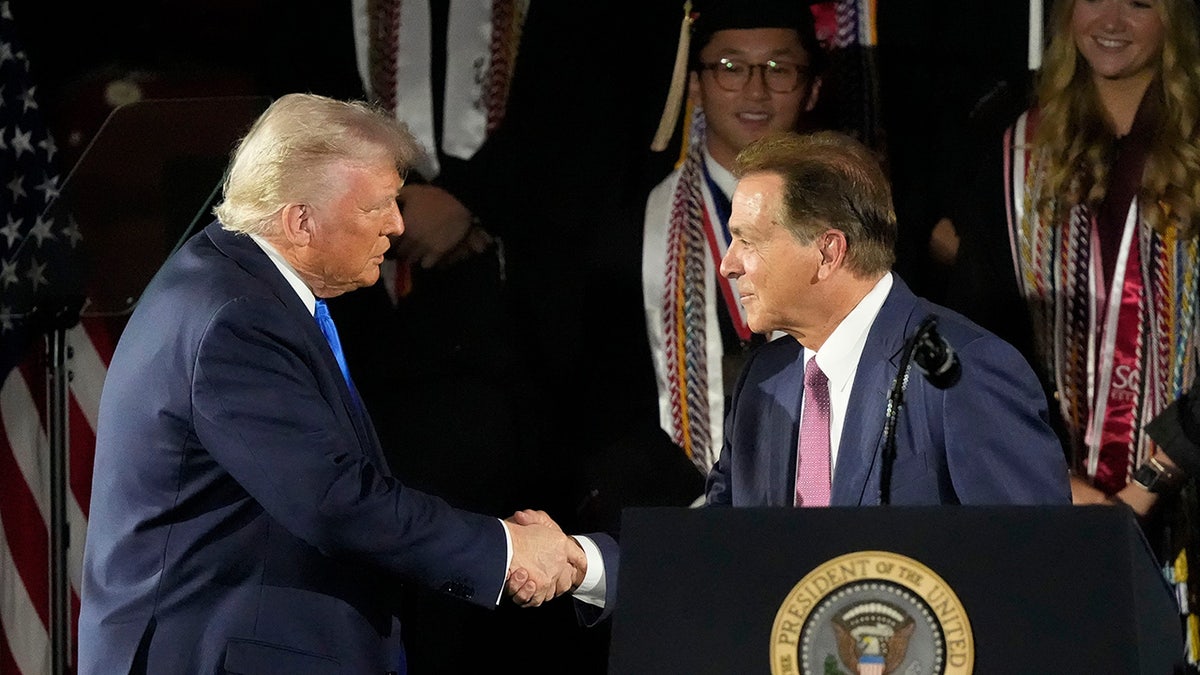
Donald Trump shakes hands with former Alabama football coach Nick Saban before delivering a special commencement address to University of Alabama graduates, May 1, 2025, in Tuscaloosa. (Gary Cosby Jr.-Tuscaloosa News)
BILL BELICHICK REPORTEDLY EXPLORING PR MOVE FOLLOWING AWKWARD TV INTERVIEW
In an appearance on Fox News Channel last year, Saban urged Congress to step in and make NIL “equal across the board.”
“And I think that should still exist for all players, but not just a pay-for-play system like we have now where whoever raises the most money in their collective can pay the most for the players, which is not a level playing field. I think in any competitive venue, you want to have some guidelines that gives everyone an equal opportunity to have a chance to be successful,” he said.
Saban said the NCAA “can handle” NIL and whatever changes are necessary, but Congress “needs to” add “national legislation.”
“Now, we just have the state legislation – and every state is different – that would protect the NCAA from litigation once we establish guidelines for the future of college athletics. But the litigation is what got us to this point right now,” Saban said. “We have to have some protection from litigation. I don’t know if it’s antitrust laws or whatever.
“I’m not versed enough on all that to really make a recommendation. But I know we need some kind of federal standard and guidelines that allows people to enforce their own rules.”
Sen. Tommy Tuberville, R-Ala., said “if anyone” can help regulate NIL, “it’s President Trump.”
Saban introduced Trump on Thursday at an event for Alabama’s graduating students, where Trump gave a speech.
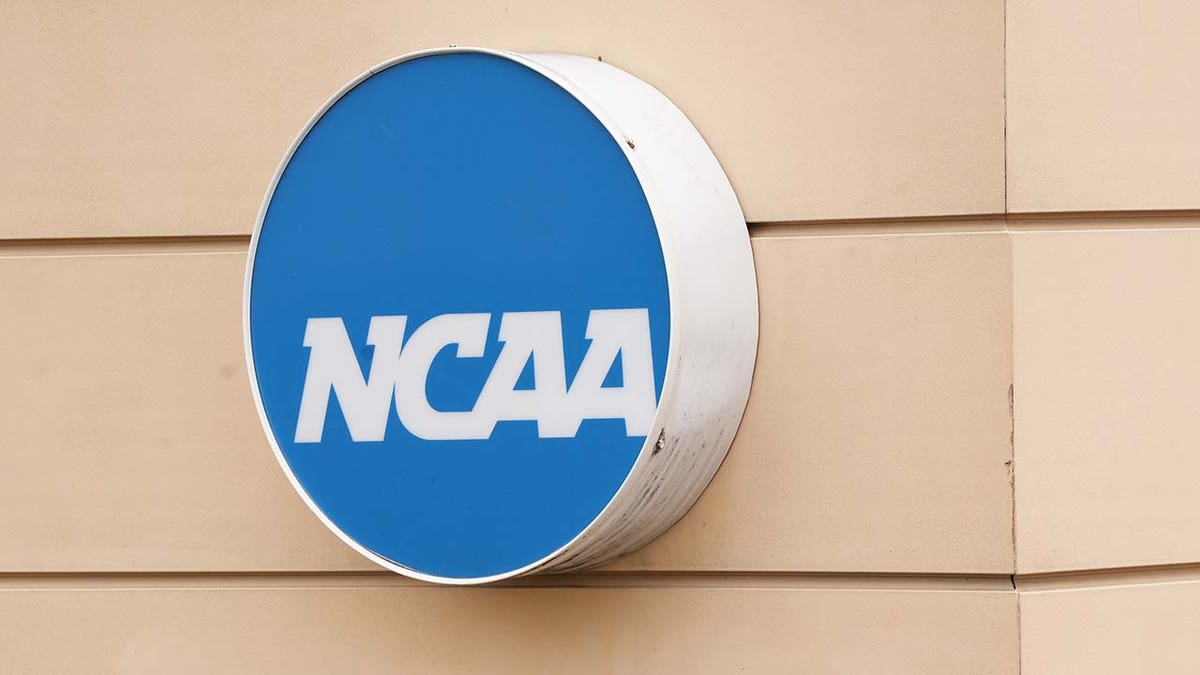
(Mitchell Layton/Getty Images)
CLICK HERE TO GET THE FOX NEWS APP
In the speech, Trump raved about Alabama’s athletic programs, saying the school is a place “where legends are made.”
Fox News’ Ryan Morik and the Associated Press contributed to this report.
Follow Fox News Digital’s sports coverage on X and subscribe to the Fox News Sports Huddle newsletter.
College Sports
Athletes express concern over NCAA settlement’s impact on non-revenue sports
Sydney Moore and Sabrina Ootsburg were surrounded by hundreds of college athletes at a convention in Charlotte when news broke that the $2.8 billion NCAA settlement had been approved by a federal judge. In a room full of college athletes, they felt like the only two people who understood the gravity of the situation. “I’m […]
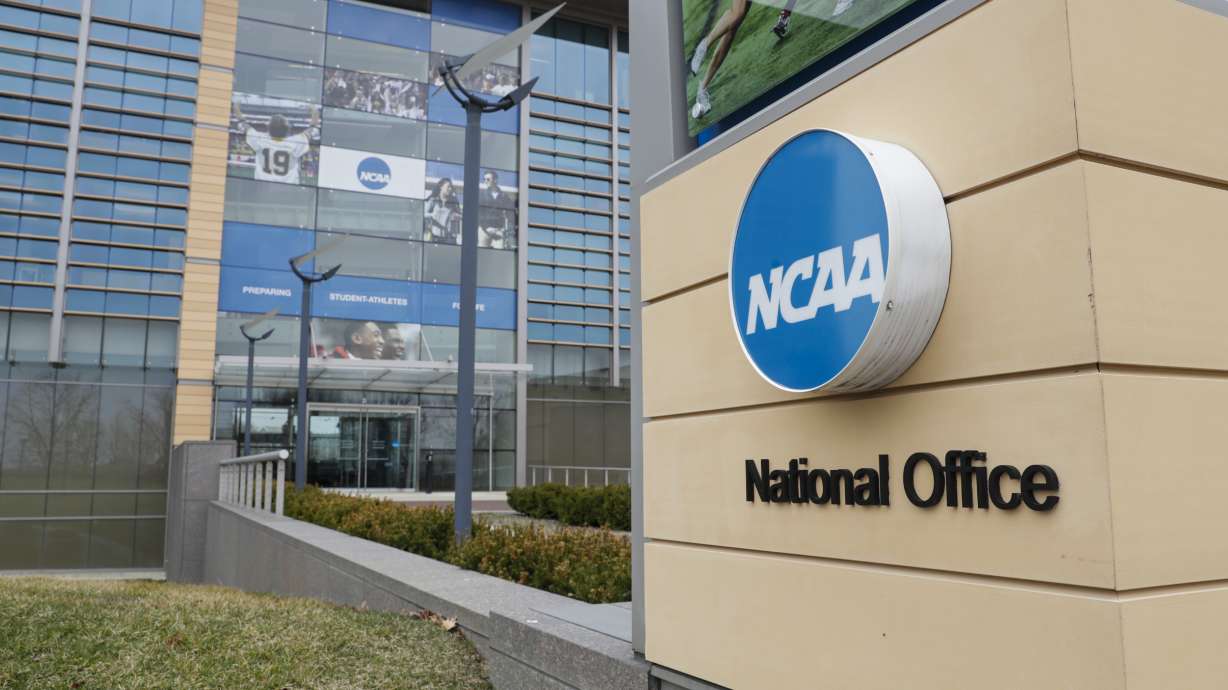
Sydney Moore and Sabrina Ootsburg were surrounded by hundreds of college athletes at a convention in Charlotte when news broke that the $2.8 billion NCAA settlement had been approved by a federal judge. In a room full of college athletes, they felt like the only two people who understood the gravity of the situation.
“I’m about to get paid,” Moore said a Division I football player told her.
“Yes, you are about to get paid, and a lot of your women athlete friends are about to get cut,” she responded.
Moore acknowledged that her response might be a stretch, but while the sprawling House settlement clears the way for college athletes to get a share of revenue directly from their schools and provides a lucky few a shot at long-term financial stability, it raises genuine concerns for others.
Schools that opt in will be able to share up to $20.5 million with their athletes over the next year starting July 1. The majority is expected to be spent on high-revenue generating sports, with most projections estimating 75% of funds will go toward football.
So what happens to the non-revenue-generating sports which, outside of football and basketball, is pretty much all of them?
It’s a query that’s top of mind for Ootsburg as she enters her senior year at Belmont, where she competes on the track and field team.
“My initial thought was, is this good or bad? What does this mean for me? How does this affect me? But more importantly, in the bigger picture, how does it affect athletes as a whole?” Ootsburg said.
“You look at the numbers where it says most of the revenue, up to 75% to 85%, will go toward football players. You understand it’s coming from the TV deals, but then it’s like, how does that affect you on the back end?” Ootsburg asked. “Let’s say $800K goes toward other athletes. Will they be able to afford other things like care, facilities, resources or even just snacks?”
Moore has similar concerns. She just completed her fifth and final year of eligibility at Syracuse University, where she was a key member of the volleyball team. Like Ootsburg, she’s become a pioneer in the NIL space and an advocate for college athletes, even though her on-court ventures are behind her.
Moore says most female athletes aren’t worried about how much – if any – money they’ll receive. They fear how changes could impact the student-athlete experience.
“A lot of us would much rather know that our resources and our experience as a student-athlete is going to stay the same, or possibly get better, rather than be given $3,000, but now I have to cover my meals, I have to pay for my insurance, I have to buy ankle braces because we don’t have any, and the athletic training room isn’t stocked,” Moore said over the weekend as news of Friday night’s settlement approval spread.
One of the biggest problems, Ootsburg and Moore said, is that athletes aren’t familiar with the changes. At AthleteCon in Charlotte, North Carolina, they said, perhaps the biggest change in college sports history was a push notification generally shrugged off by those directly impacted.
“Athletes do not know what’s happening,” Ootsburg said. “Talking to my teammates, it’s so new, and they see the headlines and they’re like, ‘OK, cool, but is someone going to explain this?’ because they can read it, but then there’s so many underlying factors that go into this. This is a complex problem that you have to understand the nuances behind, and not every athlete truly does.”
Some coaches, too, are still trying to understand what’s coming.
Mike White, coach of the national champion Texas softball team, called it “the great unknown right now.”
“My athletic director, Chris Del Conte, said it’s like sailing out on a flat world and coming off the edge; we just don’t know what’s going to be out there yet, especially the way the landscape is changing,” he said at the Women’s College World Series in Oklahoma City. “Who knows what it’s going to be?”
Jake Rimmel got a crash course on the settlement in the fall of 2024, when he said he was cut from the Virginia Tech cross-country team alongside several other walk-ons. The topic held up the House case for weeks as the judge basically forced schools to give athletes cut in anticipation of approval a chance to play — they have to earn the spot, no guarantees — without counting against roster limits.
Rimmel packed up and moved back to his parents’ house in Purcellville, Virginia. For the past six months, he’s held on to a glimmer of hope that maybe he could return.
“The past six months have been very tough,” he said. “I’ve felt so alone through this, even though I wasn’t. I just felt like the whole world was out there – I would see teammates of mine and other people I knew just doing all of these things and still being part of a team. I felt like I was sidelined and on pause, while they’re continuing to do all these things.”
News that the settlement had been approved sent Rimmel looking for details.
“I didn’t see much about roster limits,” he said. “Everyone wants to talk about NIL and the revenue-sharing and I mean, that’s definitely a big piece of it, but I just didn’t see anything about the roster limits, and that’s obviously my biggest concern.”
The answer only presents more questions for Rimmel.
“We were hoping for more of a forced decision with the grandfathering, which now it’s only voluntary, so I’m a little skeptical of things because I have zero clue how schools are going to react to that,” Rimmel told The Associated Press.
Rimmel is still deciding what’s best for him, but echoed Moore and Ootsburg in saying that answers are not obvious: “I’m just hoping the schools can make the right decisions with things and have the best interest of the people who were cut.”
___
AP Sports Writer Cliff Brunt contributed.
___
AP college sports: https://apnews.com/hub/college-sports
College Sports
Simone Biles Ignites Gymnastics World with Bold Comment
Simone Biles Sparks Debate with Bold Comment Simone Biles, a titan in the gymnastics world with 11 Olympic medals to her name, found herself at the center of a heated debate this week. Her critique of former swimmer and activist Riley Gaines, whom she labeled “sick” for comments about a transgender softball player, has ignited […]

Simone Biles Sparks Debate with Bold Comment
Simone Biles, a titan in the gymnastics world with 11 Olympic medals to her name, found herself at the center of a heated debate this week. Her critique of former swimmer and activist Riley Gaines, whom she labeled “sick” for comments about a transgender softball player, has ignited a fervent discussion online. Biles’ assertion that Gaines was “bullying” a high school athlete has drawn significant attention and backlash, reflecting the complex nature of discussions surrounding sports and gender identity.
The Power of Influence
Biles’ words carry immense weight, given her status as an iconic figure in sports. Her decision to publicly challenge Gaines highlights the responsibility that comes with such influence. By stepping into this contentious arena, Biles underscores the ongoing tension between advocacy and differing viewpoints within the sports community. Her comment not only reflects her personal stance but also serves as a catalyst for broader discussions on inclusivity and representation in athletics.
Reaction and Repercussions
The response to Biles’ comment was swift and polarized. Among the voices was that of former sportscaster Sage Steele, who openly criticized Biles for her stance. This reaction underscores the divisive nature of the topic, where opinions are deeply entrenched and emotions run high. The backlash Biles faced illustrates the challenges athletes encounter when they leverage their platforms to address societal issues, particularly those as complex as gender identity in sports.
A Broader Conversation
This incident serves as a microcosm of the larger discourse on the intersection of sports, identity, and fairness. Biles’ engagement in this dialogue brings to light the evolving landscape of athletics, where traditional norms are being questioned and redefined. The conversation extends beyond the individuals involved, touching on the principles of inclusion, the rights of transgender athletes, and the role of public figures in shaping these narratives.
Looking Forward
As the dust settles, the implications of this exchange are likely to resonate within the sports community and beyond. Biles’ willingness to speak out on such a sensitive issue may inspire others to voice their perspectives, fostering a more open dialogue. Ultimately, this moment serves as a reminder of the power of athletes to influence societal change, and the importance of navigating these discussions with empathy and understanding. As the world of sports continues to evolve, the voices of athletes like Biles will be crucial in guiding the path forward.
College Sports
Olympic icon Simone Biles talks to Hong Kong students about protecting your mental health – Young Post
Simone Biles has 11 Olympic medals and 30 World Championship wins. She is often considered one of the best gymnasts of all time. Still, even she has to deal with negativity online. “That was hard for me to wrap my head around, [but] since we are competing on a global stage, there is going to […]
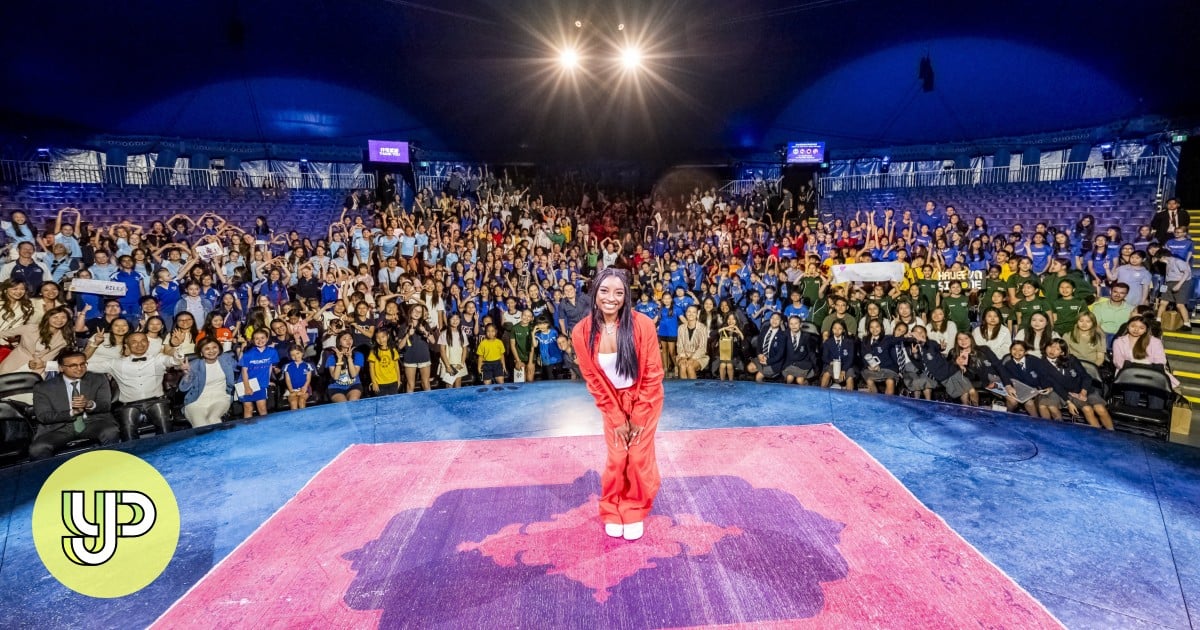
Simone Biles has 11 Olympic medals and 30 World Championship wins. She is often considered one of the best gymnasts of all time. Still, even she has to deal with negativity online.
“That was hard for me to wrap my head around, [but] since we are competing on a global stage, there is going to be feedback,” Biles, 28, told the crowd eager to hear her speak during her first visit to Hong Kong last month.
Reading such harsh remarks can be difficult for her, and replying to them only puts her in a negative mindset, so she has learned to protect herself.
“When I’m not mentally well enough to read the comments, I turn them off or ignore them,” she said. She also reminds herself that many of these people are strangers: “They don’t know me, and they don’t know my character, so how can they judge through a screen?”
During the one-hour event hosted by UBS investment bank, Biles spoke to more than 500 students – many of them budding gymnasts – about her record-breaking career and maintaining her mental health under so much public pressure.
As a professional athlete, taking care of your mental health is just as important as your physical health, Biles explained.
“Elite athletes [face] a lot of mental effort to step onto the big stage and compete for your country. Obviously, it’s such an honour, but it can be really tough,” she said.
Sports psychologist discusses why teen athletes struggle to keep their head in the game
Knowing when to step back
The training schedule of a professional athlete is gruelling: Biles and her team train 32 to 34 hours a week. They do two workouts on weekdays and one on Saturday, taking only Sunday off.
Considering how much time is spent training, Biles stunned the world at the Tokyo Olympics in 2021 when she withdrew from several events, including the team final, all-around final, and individual event finals.
The reason for her decision was a mental condition called the “twisties”, a term gymnasts use to describe the feeling of losing perception of their bodies while in the air.
Having the twisties can make them feel like their rhythm is off and that they are not in control of their movements – and it can lead to serious injuries.
Biles looks back on the experience – and the way she prioritised her mental health – positively.
Simone Biles poses with her gold medal during the podium ceremony after the artistic gymnastics women’s all around final during the Paris 2024 Olympic Games on August 1, 2024. Photo: AFP/Getty Images/TNS
“I think the mental health journey is something so unique and special, and it’s very personal to you, but really, it’s the most courageous I’ve ever felt,” she said. “The number one reason why I did it was to speak out and stand up for myself. And for the first time, I felt worth more than gold, and that people could relate to me.”
Having a strong support system helped her feel confident about her decision: “My team, my family, the nurses and doctors and the mental health specialists, they all understood, and we were all on the same page that this was the correct move,” she said.
“Having people in your circle of trust that help you and you can confide in really, really helps,” she explained. “If I’m ever having a bad day, they let me have bad days, and they cheer me up. On the good days, they still uplift me.”
Just three years later, Biles competed at the 2024 Paris Olympics, winning three gold medals and one silver.
‘Fly High’ charity sports programme gets Hong Kong youth moving
Meaning of mentorship
Outside of gymnastics, Biles is also passionate about supporting children in the foster care community.
When she was only three years old, she and her siblings entered foster care because their biological mom was struggling with substance abuse. After a few years, Biles was adopted by her grandfather and his wife.
“I never let what happened to me stop me from believing in my dreams,” she said. “It doesn’t matter how you start; it matters where your journey takes you and how you walk that path.”
For the last few years, she has worked with Friends of the Children. The organisation partners with community organisations, schools, and foster care systems to pair children in need of long-term, nurturing relationships with an older friend who acts as their mentor.
Biles said the organisation has expanded from around four chapters to more than 40 across the US during her involvement.
“A lot of people think that foster kids can’t do great things, but I think we’ve proven over so many years [we can]. Never let that determine who you are,” she said.
Biles’ story inspired many of the students who came to listen to her. Photo: Handout
Students who listened to her story said they were inspired. Fifteen-year-old Ila Chan, who has been on the Hong Kong gymnastics team since she was nine, said her biggest takeaway was learning how to cope with stress and handle high-pressure situations.
“She should keep going because she’s an idol for lots of people around the world,” Ila said.
Meanwhile, Lexie Rhodes, 12, who has been doing gymnastics for around five years, said she felt encouraged to recharge, saying she learned the importance of letting off steam and taking the time to relax.
Biles appreciates the chance to serve as a role model and encourage young people, especially aspiring athletes. She offered up a tip for staying motivated and avoiding burnout: make sure you’re always having fun.
“You never know how long your career is gonna last,” she said. “So I would say to just have fun. Dream big, and then dream bigger after that. As long as you’re having fun, you can accomplish anything and love what you do.”
chapters 分會
local or regional branches of an organisation
foster care 寄養照顧
a system in which children who cannot live with their biological family are moved into homes with temporary parents or caregivers
elite 精英
to be highly skilled in a particular field
gruelling 辛苦
something difficult or exhausting
confide 傾訴
to share personal thoughts or feelings with someone you trust
College Sports
Alex Cooper Claims Sexual Harassment By Soccer Coach In New Hulu Documentary
Podcast giant Alex Cooper, a top soccer player in high school who went to Boston University on a full scholarship, described what she claimed was three years of escalating sexual harassment by her coach there, Nancy Feldman, that she said ended with her leaving the team senior year. The allegations were met with audible gasps […]



Podcast giant Alex Cooper, a top soccer player in high school who went to Boston University on a full scholarship, described what she claimed was three years of escalating sexual harassment by her coach there, Nancy Feldman, that she said ended with her leaving the team senior year.
The allegations were met with audible gasps in the audience at the end part 1 of a new Hulu documentary series Call Her Alex, which just premiered at the Tribeca Festival. In a Q&A after, Cooper said it took her ten years to come forward, which she did in large part because of the documentary, a behind the scenes look at the first live show of her hit podcast Call Her Daddy. The first leg was in Boston. Director Ry Russo-Young asked her to walk out on the BU soccer field and reflect on what it meant to her.
“And the minute I stepped back on the field, I felt so small. I felt just like I was 18 years old again. And I was in a situation with someone in a position of power who abused their power. And I felt like I wasn’t the Call Her Daddy girl. I wasn’t someone who had money and influence or whatever it be. I was just another woman who experienced harassment on a level that changed my life forever and took away the thing I loved the most,” she said during a Q&A after.
Watch on Deadline
She chose to go public to help herself heal and because she claims it is still an issue at the college.
Feldman retired in 2022. University officials who Cooper claims brushed off her allegations are still there, she said. In the doc, she alleges the officials asked her, “What do you want?” but that said they were not going to fire Feldman, did not investigate, but said she could keep her full soccer scholarship.
Deadline has reached out to Boston University for comment.
“During the filming of this documentary, I found out that the harassment and abuse of power is still happening on the campus of Boston University, and I spoke to one of the victims, and hearing her story was horrific, and I knew in that moment, if I don’t speak about this. It’s going to continue happening,” Cooper claimed.
“I’m thinking about the amount of women who’ve probably experienced this, not just on that campus, but on a larger scale in the workplace. This isn’t just happening on college campuses for soccer. This is everywhere. This is systemic. And so I knew it was time to speak about it, and I was terrified, and I’m still terrified. I’m shaking. I feel like I’m a decent public speaker at this point, but I’m scared,” she said.
It also pained Cooper that her that her alleged harasser was a woman, she said.
In the documentary, she claims a pattern that started sophomore year in earnest as the coach focused increasingly on her personally, not on her playing, with questions and comments about her body and her romantic life. She alleged Feldman would try to get her alone, put a hand on her thigh, stare at her, and once asked if she had had sex the previous night.
“It was this psychotic game of ‘You want to play, tell me about your sex life’,” Cooper said in the doc. When she tried to resist, she claimed, Feldman threatened “consequences.” She accused the coach of retaliating on the field by benching her often, including for most of a key championship game, to the confusion of her teammates.
Hulu release a trailer last week. It launches June 10.
Cooper has alluded to a college trauma in the past.
She initially launched the advice and comedy podcast Call Her Daddy in 2018, alongside her then co-host Sofia Franklyn, with Barstool Sports before signing a deal, thought to be worth around $60 million, with Spotify in 2021. The show exploded with women and became second only to The Joe Rogan Experience on the podcast charts before she moved to SiriusXM last year in a deal valued around $120 million.
“I think a lot of this process almost made me realize, if I have the finances to pay for a lawyer and I have the resources to do all these things, how is another woman going to feel comfortable to come forward? I’m still f–king scared up here, you know. And I was nobody when I was in college. I did come forward. I was denied, essentially. And so the story is frustrating, because I want to tell women come forward … But I did, and I wasn’t believed, and then it took me a decade, Cooper said tonight.
“I actually think this is just the beginning. It’s really opened my eyes to how difficult the system is, and it’s so built against us as women, and we have to fight so fucking hard to have our voices heard, and we are denied, or we’re questioned, or you feel shame, and that started to really get in my head of, how am I about to not put this in the documentary? … I realized, holy shit, I have so much more work to do, and I’m going to use my platform to hopefully inspire other people to come forward and tell their stories, because conversation is the only way that we’re going to actually have change and we’re going to make change.”
MORE
College Sports
News: Lisa Salters, Jay Harris, Bill Plaschke, ESPN studios
ESPN’s lead NBA sideline reporter Lisa Salters will be absent from Game 2 of the Finals Sunday night. Plus: ESPN SportsCenter anchor Jay Harris announces he has cancer; LA Times writer Bill Plaschke announces he has Parkinson’s; ESPN is moving three morning shows from its Seaport Studios. Salters to miss Game 2 of Finals Lead […]
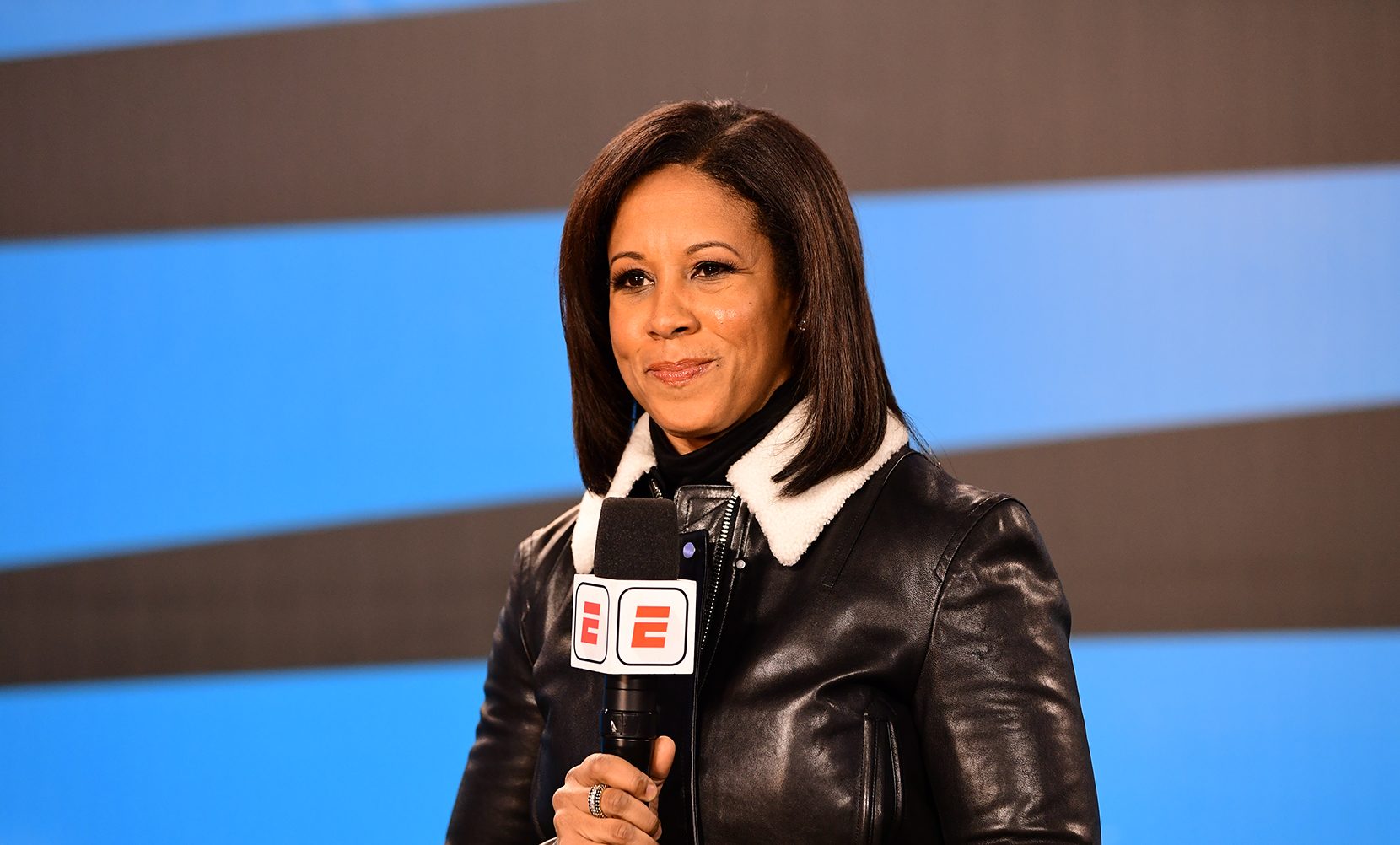
ESPN’s lead NBA sideline reporter Lisa Salters will be absent from Game 2 of the Finals Sunday night. Plus: ESPN SportsCenter anchor Jay Harris announces he has cancer; LA Times writer Bill Plaschke announces he has Parkinson’s; ESPN is moving three morning shows from its Seaport Studios.
Salters to miss Game 2 of Finals
Lead ESPN NBA sideline reporter Lisa Salters will miss Sunday’s NBA Finals Game 2 on ABC, according to a network press release. Jorge Sedano, who had been covering the Finals as a sideline reporter for ESPN Radio, will replace her. (Vanessa Richardson will fill in for Sedano on radio.)
In a statement, ESPN said Salters is out due to personal reasons. Her partner and ESPN colleague, Indiana Fever head coach Stephanie White, also missed her team’s game Saturday night for personal reasons.
Salters also missed a couple of Monday Night Football games for ESPN/ABC last season.
SportsCenter anchor Harris announces cancer diagnosis
Longtime ESPN SportsCenter anchor Jay Harris announced last week that he is battling prostate cancer and will undergo surgery on Tuesday. Harris, who has been with ESPN since 2003, said on ESPN’s corporate blog that he hopes he can return to work “in a month or so, 100 percent healthy.”
Harris regularly anchors SportsCenter alongside Hannah Storm, who had a cancer scare of her own last year.
LA Times writer Plaschke announces he has Parkinson’s
Los Angeles Times writer Bill Plaschke, a regular contributor on the now-canceled “Around the Horn,” announced in a story published Sunday that he has Parkinson’s disease.
Plaschke wrote that he was diagnosed four years ago but had not previously disclosed his condition, even to his bosses. On social media, viewers of “Around the Horn” had expressed some concern about his condition during his recent appearances.
ESPN moving Seaport studio shows to new facility
ESPN said last week that it is moving its daily morning shows “Get Up,” “First Take” and “Unsportsmanlike” to a new facility at 7 Hudson Square in Manhattan, ending their run at the Seaport Studios at the edge of the borough. “Get Up” will be first to make the move effective Monday, followed by the two other series on June 23.
Though it was not said in the press release, it would seem to be obvious that ESPN is closing the Seaport Studio, as has long been reported. In addition to those three shows leaving, the network canceled “Around the Horn” — which originated from the same studio — last month.
College Sports
Understanding new college model after House vs. NCAA settlement
Collegiate athletics is set to move forward with its new model in the wake of the House vs. NCAA settlement. It’s a complex time for collegiate sports fans, to be sure, as they look to understand the modifications and how they will be applied and enforced. Many have kept up with the House vs. NCAA […]

Collegiate athletics is set to move forward with its new model in the wake of the House vs. NCAA settlement.
It’s a complex time for collegiate sports fans, to be sure, as they look to understand the modifications and how they will be applied and enforced.
Many have kept up with the House vs. NCAA landmark case, which was granted preliminary approval by Judge Claudia Wilken last October before its April 7 hearing.
The final settlement was granted last Friday night, after Wilken pushed back on the roster limit restriction stipulation, wanting that to be applied over time so as not to displace 5,000 student-athletes at once.
Here’s a look at some key elements of the ruling and the initial models and plans to run and regulate the overhauled collegiate sports model.
Settlement Terms
Schools will begin paying student-athletes out of a $20.5 million allowance, or “cap,” for the usage of their name, image and likeness (NIL).
The cap allowance will increase by 4 percent each year of the 10-year agreement.
The settlement terms take effect on July 1 and includes:
• backpay ($2.8 billion) to collegiate athletes who competed between 2016 and 2024, for prior usage of their name, image and likeness
• the elimination of scholarship limits,
• a $20.5 million allowance, or “cap” for schools to pay current student-athletes for the usage of their NIL
• “grandfathered” roster limits — athletes currently on teams will be able to finish their careers through their scholarship terms before new roster limits (105 for football) take effect (list below).
In addition to the $20.5 million athletic departments can disperse through their athletic programs, student-athletes can negotiate outside NIL deals.
Collegiate sports regulation
The Power Four conferences — the SEC, Big Ten, Big 12 and ACC — will regulate and enforce player compensation.
A newly appointed “College Sports Commission” (CSC) will oversee the new system in place that allows schools to share its revenue (via the $20.5 million) and ensure that outside NIL deals are fair and comply with rules.
Former Major League Baseball executive vice president, legal & operations Bryan Seeley was named the CEO of the College Sports Commission (CSC) on Friday night.
Seeley’s CSC will see to it that student-athlete NIL deals not associated with the money paid directly by the university be approved by third-party clearinghouse Deloitte.
Investigations into the deals are expected to be resolved in 45 days, per ESPN sources.
The CSC looks to get schools to sign into an agreement for CEO’s to have the power to make “final factual findings and determinations” on violations of rules, and have the authority “impose such fines, penalties or other sanctions as appropriate” in order to uphold new rules and stipulations.
NIL Deal Approvals
Deloitte’s approvals will put the proposed deals through a clearinghouse called “NIL Go,” which involves a three-step process, as explained in a three-page memo that has been distributed to the schools, per NILrevolution.com.
Per the website, NIL Go will:
• efficiently clear legitimate third-party NIL deals valued at $600 or more
• reflect the true market value of NIL deals without arbitrary value regulation, and,
• support the enforcement of the deals, along with supporting the schools and student-athletes
Deloitte’s NIL Go involves a there-step process:
1. Payor Association Verification
“Schools will initially determine the association status of payors (i.e., whether they are “associated” entities or individuals) to determine whether a fair-market-value assessment is required. In doing so, schools will use several criteria such as whether the entity/individual exists primarily to support the athletics program, provides exclusive NIL opportunities for the school, contributes more than $50,000 over a lifetime, and employs or owns certain roles tied to the school or associated entities”
2. Valid Business Purpose Verification
“Next, schools will determine whether a payor’s intent is to use the student-athlete’s NIL to legitimately advance business objectives. On the payor level, the school will verify the payor’s identity and intent. On the deal level, the school will review the details of the NIL deal and any supporting documents for the purpose of flagging any issues.”
3. Range of Compensation Analysis
“Finally, Deloitte will use a 12-point analysis to assess whether the compensation aligns with similarly situated individuals in comparable NIL deals.
This range of compensation analysis will apply solely to third-party NIL deals with “associated” entities or individuals, using historical deal data involving both college and professional athletes as benchmarks, and excluding roster value and recruiting incentives.
Deloitte will assess factors such as athletic performance, social media presence, local and institutional market size, and brand influence to determine the fair-market-value of each individual student-athlete’s deal.
Upon completion of this process, Deloitte will communicate the status of each individual deal as either “cleared,” “in review,” or “information needed.”
If a student-athlete’s deal falls into either of the latter two categories (i.e., it is not “cleared”) the student-athlete has four options. They may: (1) renegotiate and resubmit the terms of the deal, (2) proceed at risk of eligibility consequences, (3) cancel the deal, or (4) request a neutral arbitrator to review the deal. Deloitte will not block any student-athlete’s deal, instead allowing the student-athlete to make his/her own decision to accept the deal with the understanding that they risk eligibility.”
Moving forward
More questions — and answers — lie ahead about collegiate sports’ new operations model amid this era of pay and free movement and immediate eligibility through the portal.
More lawsuits are expected as the legalities of the stipulations are tested, and more tweaks and modifications will be made as leadership navigates this new landscape.
There are sure to be unintended consequences, in addition to the litigation, for the universities’ leadership to manage and explain.
It’s a new path, to be certain, even as the collegiate sports main objectives and the rules of the games and competitions remain largely the same.
Roster limits
Source: NCSAsports.org
| * | |||
|---|---|---|---|
| Tumbling (W) | 14 | 55 | 41 |
| Baseball (M) | 11.7 | 34 | 22.3 |
| Basketball (M) | 13 | 15 | 2 |
| Basketball (W) | 15 | 15 | 0 |
| Beach volleyball (W) | 6 | 19 | 13 |
| Cross country (M) | 5 | 17 | 12 |
| Cross country (W) | 6 | 17 | 11 |
| Field hockey (W) | 12 | 27 | 15 |
| Football (M) | 85 | 105 | 20 |
| Golf (M) | 4.5 | 9 | 4.5 |
| Golf (W) | 6 | 9 | 3 |
| Gymnastics (M) | 6.3 | 20 | 13.7 |
| Gymnastics (W) | 12 | 20 | 8 |
| Ice hockey (M) | 18 | 26 | 8 |
| Ice hockey (W) | 18 | 26 | 8 |
| Track (M) | 12.6 | 45 | 35.4 |
| Track (W) | 18 | 45 | 27 |
| Lacrosse (M) | 12.6 | 48 | 35.4 |
| Lacrosse (W) | 12 | 38 | 26 |
| Rowing (W) | 20 | 68 | 48 |
| Soccer (M) | 9.9 | 28 | 18.1 |
| Soccer (W) | 14 | 28 | 14 |
| Softball (W) | 12 | 25 | 13 |
| Stunt (M/W) | 14 | 65 | 51 |
| Swim (M) | 9.9 | 30 | 20.1 |
| Swim (W) | 14 | 30 | 16 |
| Tennis (M) | 4.5 | 10 | 5.5 |
| Tennis (W) | 8 | 10 | 2 |
| Triathlon (W) | 6.5 | 14 | 7.5 |
| Volleyball (M) | 4.5 | 18 | 13.5 |
| Volleyball (W) | 12 | 18 | 6 |
| Water polo (M) | 4.5 | 24 | 19.5 |
| Water polo (W) | 8 | 24 | 16 |
| Wrestling (M) | 9.9 | 30 | 20.1 |
| Wrestling (W) | 10 | 30 | 20 |
*The listed sports are offered services by NCSA College Recruiting. D1 sports not shown in the table, including Bowling, Fencing, Equestrian, Rifle and Skiing, will also have scholarship and roster implications.
-
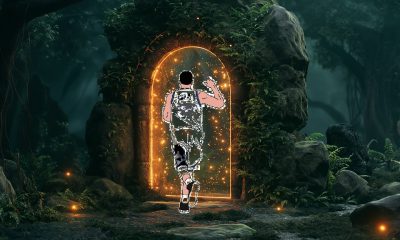
 College Sports3 weeks ago
College Sports3 weeks agoPortal Update – Basketball and Gymnastics Take Hits
-

 College Sports3 weeks ago
College Sports3 weeks agoPortal Update – Basketball and Gymnastics Take Hits
-
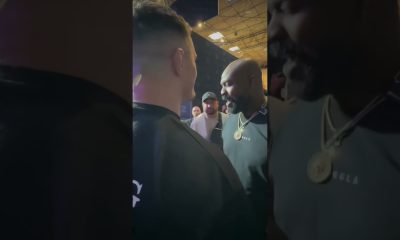
 Professional Sports3 weeks ago
Professional Sports3 weeks agoJon Jones answers UFC retirement speculation as fans accuse champion of 'holding the belt …
-
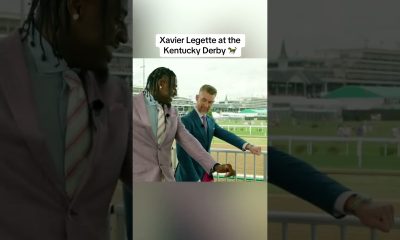
 Youtube3 weeks ago
Youtube3 weeks agoXavier Legette taught Marty Smith his signature celly
-

 NIL2 weeks ago
NIL2 weeks ago2025 NCAA Softball Tournament Bracket: Women’s College World Series bracket, schedule set
-

 College Sports3 weeks ago
College Sports3 weeks agoNCDC Commitment Profiles: Cyclones’ Martins Moving On to Saint Anselm College • USPHL
-
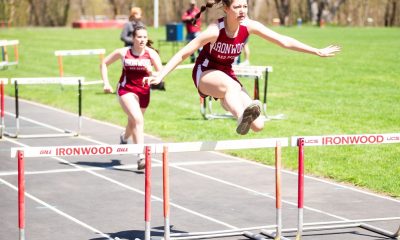
 High School Sports3 weeks ago
High School Sports3 weeks agoToday in the MHSAA
-

 Motorsports2 weeks ago
Motorsports2 weeks agoWhy IHOP Rode With Dale Earnhardt Jr. In Amazon NASCAR Debut
-

 Health3 days ago
Health3 days agoOregon track star wages legal battle against trans athlete policy after medal ceremony protest
-
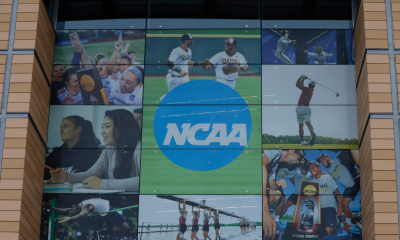
 College Sports3 weeks ago
College Sports3 weeks agoPower Four schools could face expulsion from conferences if they don’t sign binding contract, per report

































